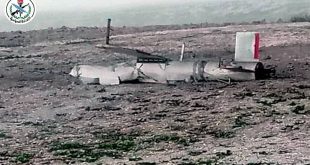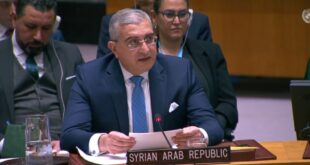New York, SANA – The UN General Assembly held Thursday evening a special session to discuss the humanitarian situation in Aleppo city, northern Syria.
Syria’s Permanent Representative to the UN Bashar al-Jaafari briefed the session on the latest developments in Aleppo and the announcement of a unilateral pause in hostilities for humanitarian purposes in the eastern parts of the city in the framework of the Russian-Syrian coordination.
He clarified that the humanitarian pause aims at allowing the evacuation of wounded, sick and elderly people from the eastern neighborhoods of Aleppo city, a mission facilitated by a team consisting of the UN organizations operating in Damascus, headed by the UN Resident Coordinator, the International Committee of the Red Cross (ICRC) and the Syrian Arab Red Crescent.
Al-Jaafari went on saying that the Syrian government has opened six corridors for evacuating civilians and two corridors for gunmen who are willing to leave and have their legal status settled.
He pointed out that the departure of civilians and gunmen was hindered due to attacks launched by the terrorist organizations, mainly Jabhat al-Nusra and Ahrar al-Sham, on these corridors and residential areas in Aleppo in which sniper fire and shells were used.
Al-Jaafari informed the UN General Assembly session that the terrorist organizations executed 14 persons in Aleppo city because they called on families to leave the neighborhoods controlled by the terrorists.
These organizations, he added, also threatened to kill those who would leave the city and burn down their houses.
He elaborated by noting that the terrorist organizations in the eastern neighborhoods of Aleppo city, which are mainly made up of 27 factions, either belonging to Jabhat al-Nusra or allied with al-Qaeda, ISIS and Jabhat al-Nusra, had rejected all humanitarian initiatives, including the Russian-U.S. agreement signed in September 9, 2016, the initiative of the Special Envoy for Syria Staffan de Mistura and the latest Syrian-Russian initiative announced on October 10.
Having stated all the above mentioned facts, al-Jaafari stressed that the Syrian government will continue to cooperate with the UN in delivering humanitarian aid to all Syrian citizens affected by the crisis wherever they are and without discrimination.
A most recent example of this continued cooperation was delivering humanitarian aid to unstable areas, including the western parts of Harasta, Qudssaya, Douma and al-Tall, said al-Jaafari, noting that work is underway to follow up on implementing the response plan for November in cooperation with the UN.
Syria’s UN Representative addressed questions to the General Assembly wondering how it is possible to improve the humanitarian situation in Syria when the coercive economic measures imposed on the Syrian people continue and when mercenary terrorists continue to flow into Syrian territory in tens of thousands across the border with Turkey.
He also wondered how there has been no progress in implementing the UN Security Council resolutions no. 2170, 2178, 2199 and 2253 that are related to combating terrorism.
Al-Jaafari dismissed the talk about allowing the terrorist groups to stay in civilian-populated regions and establish self-administered areas as collaboration with terrorism, noting that the fact that the locals welcomed the Syrian army in the areas where reconciliations were achieved only proves that those locals had been against having their neighborhoods controlled by the gunmen.
For his part, Russia’s UN Permanent Representative Vitaly Churkin addressed the session saying that the US has supported with money and weapons those who took up arms against the Syrian state, who later joined ISIS and Jabhat al-Nusra, noting that the humanitarian situation would improve if that support stopped.
Churkin affirmed it was time that the US met its obligations of separating the terrorists from what it calls “moderate opposition”.
The Chinese Permanent Representative to the UN Liu Jieyi expressed his welcoming of the Russian-Syrian humanitarian pause in Aleppo, stressing that the international efforts in Syria should be focused on fighting terrorism, launching political talks and delivering humanitarian aid.
The unilateral humanitarian pause in Aleppo was also welcomed by the UN Secretary General Ban Ki-moon, who said the pause could help in paving the way for implementing the medical evacuation plan of the UN.
De Mistura also welcomed the humanitarian pause, saying it should be used by the UN and its partners to evacuate the injured and those who are willing to leave Aleppo and allow in medical and humanitarian assistance.
He noted that there were attacks by the terrorists that targeted the UN bodies in Syria.
De Mistura revealed a plan for a “comprehensive initiative” on Aleppo, stressing that the unity and territorial integrity of Syria are two sacred principles.
H. Said
 Syrian Arab News Agency S A N A
Syrian Arab News Agency S A N A




